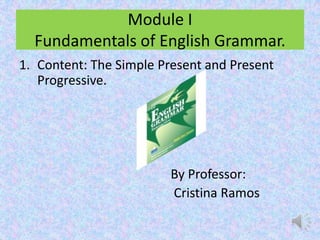
Presentación1 tecnologia11
- 1. Module I Fundamentals of English Grammar. 1. Content: The Simple Present and Present Progressive. By Professor: Cristina Ramos
- 2. The Simple Present and Present Progressive • Simple present is also called present simple. • Form: affirmative negative question I I am. I am not. Am I? he/she/it He is. He is not. Is he? you/we/ You are. You are Are you? they not.
- 3. The simple present tense is used for two main types of action Habits Actions which happen regularly (for example, every day or every week) Things which do not often States change (for example, opinions and conditions)
- 4. The SimplePresent • Rules: • Add-s to the base form in3rd person singular ( he, she, it). • Use don´t and doesn´t for negatives plus the base form of the verb. • - I don´t go to bed before 10:00 p.m. • - He doesn´t talk Spanish very well.
- 5. The Simple Present: Yes/No questions • Use do/does and the base form of the main verb. • Do you speak English? Yes, I do. No I don´t. • Does she live near you? Yes, she does. No, she doesn´t.
- 6. Present Progressive • Form : affirmative negative question I I am playing. I am not Am I playing. playing? he, she, it He is playing. He is not Is he playing. playing? you, we, they You are playing. You are not Are you • Rules: playing. playing? • A single, silent e at the end of the word is dropped before ing. • * come- coming • But: ee at the end of the word is not changed. • * agree- agreeing • The final consonant after a short, stressed vowel is doubled before ing. • * sit - sitting • The letter l as final consonant after a vowel is always doubled before ing. • *travel- travelling
- 7. Present Progressive • H He is reading a book now… Make silence silence. • Peter is listening to his radio at this m moment. • It is raining at present....Let`s stay • at home!!
- 8. Common present progressive time expressions include: • At the moment, now, today, this week, this month, tomorrow, next week (for future arrangements ), currently. • Question word + conjugate the helping verb 'be' + subject + verb + -ing. • What -> are you -> doing this afternoon? What -> is he -> doing this afternoon? What -> is she -> doing this afternoon? What -> is it -> doing this afternoon?
- 9. Present Continuous - Practice
- 10. Complete the sentences with the Simple Present or the Present Progressive ) John ____________football at the moment. 2) We often___________ tests at our school. 3) I ___________ to my teacher now. 4) Look! Mandy and Susan __________a film on TV. 5) Olivia ___________her uncle every weekend. 6) Now the sun ________________. Progressive. 7) They sometimes ___________ poems in the lessons. 8) Listen! The band ___________the new guitar. 9) First I_____________, then I dress. 10) Every morning my mother ___________up at 6 o'clock.
- 11. Look at the images an write sentences about what are they doing? • The boys are playing football.
- 12. Content Objectives • The student improves the four linguistic skills. • The student recognizes basic structure verb tenses (simple present, present progressive) • The student recognizes word function in sentence usage ( nouns, verbs, pronouns, adjectives). • Constructs sentences using pictures in present or progeessive tenses.
- 13. Estrategies • Reaches teaching objectives. • Motivates students for the lessons. • Plans the teaching materias. • Monitorates students behabior´s. • Organizes information which is going to be taught through mind maps, semantic webs, etc.
- 14. Glossary • Strategy: • Module: • Nouns: • Objective: • Adjectives: • Skills: • Verb:. • Present: • Progressive: • Assignments: • Evaluation:
- 15. Assignments • Reviewing prior knowledge. • Presenting a visual aid with sentences related to the topic. • Asking questions to peer about daily routines or facts. • Answering Yes/No questions. • Completing sentences with simple present and present progressive.
- 16. Evaluation • Classwork and workshop….………………20% • Assignments….………………………………… 20% • Class participation…….………............... 20% • Oral Presentation……………………………..20% • Written test…………………………………….. 20%
- 17. Bibliography • Allen Ascher & Joan Saslow- Top Notch 1, Pearson, 2006. • Escudero, Maria T.- La Comunicación en la Enseñanza. Editorial Trillas. Mexico, 1997. • Kallestein, Hellen Rosenfield- Grammar Step by Step 2, McGraw Hill, 2004. • Schrampfer Azar, Betty- Understanding and Using English Grammar, Pearson Education, 1999. • You-tube website.